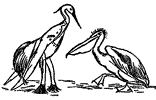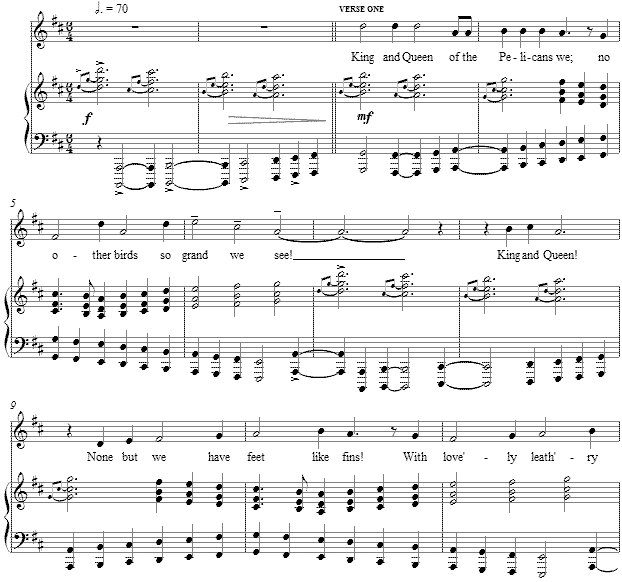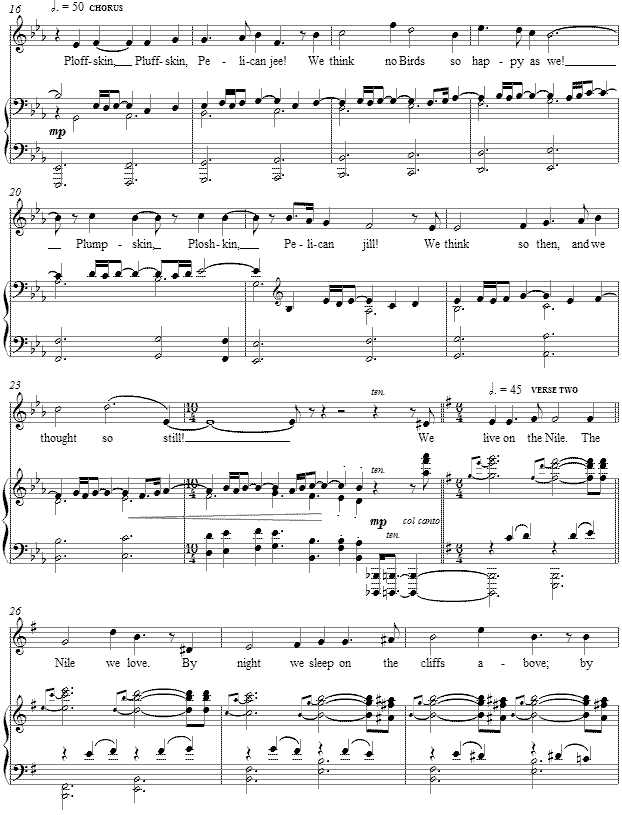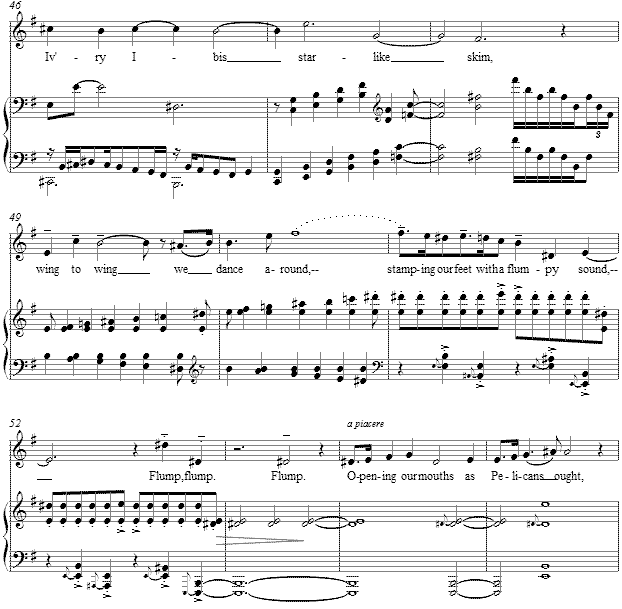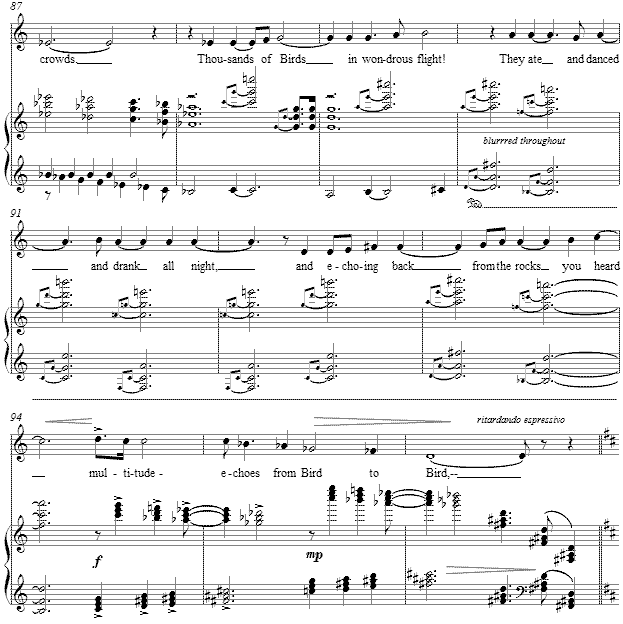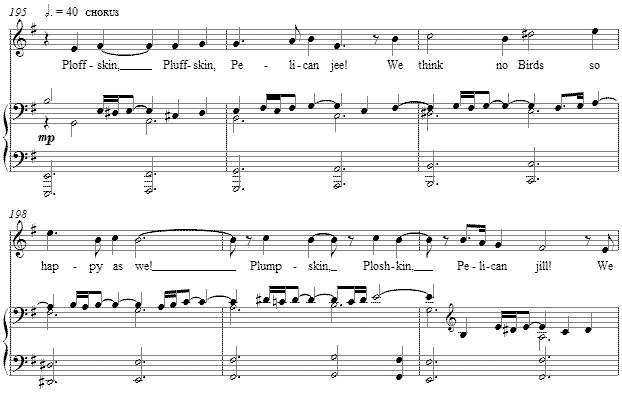Music and Texts of GARY BACHLUND
Vocal Music | Piano | Organ | Chamber Music | Orchestral | Articles and Commentary | Poems and Stories | Miscellany | FAQs
The Pelican Chorus - (2008)
Edward Lear
for medium high voice and piano
King and Queen of the Pelicans we;
No other Birds so grand we see!
None but we have feet like fins!
With lovely leathery throats and chins!
Ploffskin, Pluffskin, Pelican jee!
We think no Birds so happy as we!
Plumpskin, Ploshkin, Pelican jill!
We think so then, and we thought so still!
We live on the Nile. The Nile we love.
By night we sleep on the cliffs above;
By day we fish, and at eve we stand
On long bare islands of yellow sand.
And when the sun sinks slowly down
And the great rock walls grow dark and brown,
Where the purple river rolls fast and dim
And the Ivory Ibis starlike skim,
Wing to wing we dance around,--
Stamping our feet with a flumpy sound,--
Opening our mouths as Pelicans ought,
And this is the song we nighly snort;--
Ploffskin, Pluffskin, Pelican jee!
We think no Birds so happy as we!
Plumpskin, Ploshkin, Pelican jill!
We think so then, and we thought so still!
Last year came out our daughter, Dell;
And all the Birds received her well.
To do her honour, a feast we made
For every bird that can swim or wade.
Herons and Gulls, and Cormorants black,
Cranes, and flamingoes with scarlet back,
Plovers and Storks, and Geese in clouds,
Swans and Dilberry Ducks in crowds.
Thousands of Birds in wondrous flight!
They ate and drank and danced all night,
And echoing back from the rocks you heard
Multitude-echoes from Bird to bird,--
Ploffskin, Pluffskin, Pelican jee!
We think no Birds so happy as we!
Plumpskin, Ploshkin, Pelican jill!
We think so then, and we thought so still!
Yes, they came; and among the rest,
The King of the Cranes all grandly dressed.
Such a lovely tail! Its feathers float
between the ends of his blue dress-coat;
With pea-green trowsers all so neat,
And a delicate frill to hide his feet,--
(For though no one speaks of it, every one knows,
He has got no webs between his toes!)
As soon as he saw our Daughter Dell,
In violent love that Crane King fell,--
On seeing her waddling form so fair,
With a wreath of shrimps in her short white hair.
And before the end of the next long day,
Our Dell had given her heart away;
For the King of the Cranes had won that heart,
With a Crocodile's egg and a large fish-tart.
She vowed to marry the King of the Cranes,
Leaving the Nile for stranges plains;
And away they flew in a gathering crowd
Of endless birds in a lengthening cloud.
Ploffskin, Pluffskin, Pelican jee!
We think no Birds so happy as we!
Plumpskin, Ploshkin, Pelican jill!
We think so then, and we thought so still!
And far away in the twilight sky,
We heard them singing a lessening cry,--
Farther and farther till out of sight,
And we stood alone in thesilent night!
Often since, in the nights of June,
We sit on the sand and watch the moon;--
She has gone to the great Gromboolian plain,
And we probably never shall meet again!
Oft, in the long still nights of June,
We sit on the rocks and watch the moon;--
--- She dwells by the streams of the Chankly Bore,
And we probably never shall see her more.
Ploffskin, Pluffskin, Pelican jee!
We think no Birds so happy as we!
Plumpskin, Ploshkin, Pelican jill!
We think so then, and we thought so still![ 16 pages, circa 9' 50" ]
Edward Lear in his own caricature
This delightful yet strangely constructed poem might be called a drama of the "empty nest." The psychological establishment has quite accepted the notion of the Empty Nest Syndrome, a time when " feelings of depression, sadness, and/or grief experienced by parents and caregivers after children come of age and leave their childhood homes. This may occur when children go to college or get married. Women are more likely than men to be affected; often, when the nest is emptying, mothers are going through other significant life events as well, such as menopause or caring for elderly parents." Long before the modern movement had identified this, it has been a simple human experience. Lear's marvelous "nonsense" poem is modeled in part on this normal life experience.
Edward Lear's cartoon of the King of the Cranes and a pelican
Edward Lear's characters, given his cartoon above of the pelican and given also the king of the cranes remark "With pea-green trowsers all so neat, / And a delicate frill to hide his feet," suggest the parent left behind and the cause for it -- marriage of a daughter. The text continually uses the plural pronoun, "we," so those left behind may mean both parents, or perhaps also the entire pelican community of the Nile. The structure of the poem is unusual, with verses between the "pelican chorus" ranging from four lines to twenty, as the various scenes in this little drama unfold. The five repetitions of the "chorus" become extended, for in this setting the last chorus begins once in the minor key before returning to a brighter major for the final summation affirming happiness -- even in the context of the "empty nest."
The opening verse is a scant four lines long, and as such the setting begins with a sharp and proud statement of the pelican royalty in a haughty D major. Octaves in the bass line add to a sonority in the classical mannerism, although the voice leadings are more modern and dissonant than this.
The "pelican chorus" then is the statement which Lear ends each scene, a set of nonsense names. The chorus slips up a half step to E flat major from the introductory verse. Are these names of members of the pelican community on the Nile? Onomatopoeia intended to suggest the "flumping sound" of their dancing feet? The change to E minor from the preceding E flat major of the chorus and a slightly slower tempo build an unusual quasi-ethnic picture of the Nile, a "land far off."
The harmonic path for the setting changes for each verse and chorus, such that until the last the chorus stands away from the preceding verse.
The overall pattern is as follows -- first introductory verse of four lines to chorus: D major to E flat major; second verse twelve lines long, and chorus: E minor to E major; third verse twelve lines long, and chorus: C major to D major; fourth verse twenty lines lone and chorus: F sharp major and back to D major; and fifth verse twelve lines long and chorus, moving through G major to E minor with a final and positive restatement in E major.
In the second verse, the "flumpy sound" of pelicans stamping their feet is captured with the seventh of the scale and the happy dissonance of the minor second. I repeat "flump" though this is an addendum to Lear's text, and not a part of the original; the performers are intended to make a parody this in some dramatic way.
The third verse offers a list of various species of birds itemized over a true polytonal harmony of colors, and after a polytonal statement of a portion of the well-known Westminster chime, a release as an "echo" brings the verse to a whole tone close through an augmented chord to the reprise of the chorus in D major.
The longest verse conveys the tale of the courtship of the pelicans' daughter, Dell, rooted on F sharp major, which gives way to E minor as an echo of the verse about pelicans living on their river, Nile, and a minor key restatement of the chorus as contemplation of their daughter living far away with the king of cranes colors for a moment the chorus' affirmation, "We think no Birds so happy as we!" Is there happiness after a bout of Empty Nest Syndrome? The answer is yes, as the chorus' final statement ends in the brighter harmonies of E major.
A cycle of Edward Lear's fantastical poems is titled, Calico Pie and Other Nonsense, for soprano and piano. A new engraving of it is being done now and a PDF of that score will be posted to this site when it is finished. On that web page, more may be read about the "delightful" Mr. Lear.
The score for The Pelican Chorus is available as a free PDF download, though any major commercial performance or recording of the work is prohibited without prior arrangement with the composer. Click on the graphic below for this piano-vocal score.

